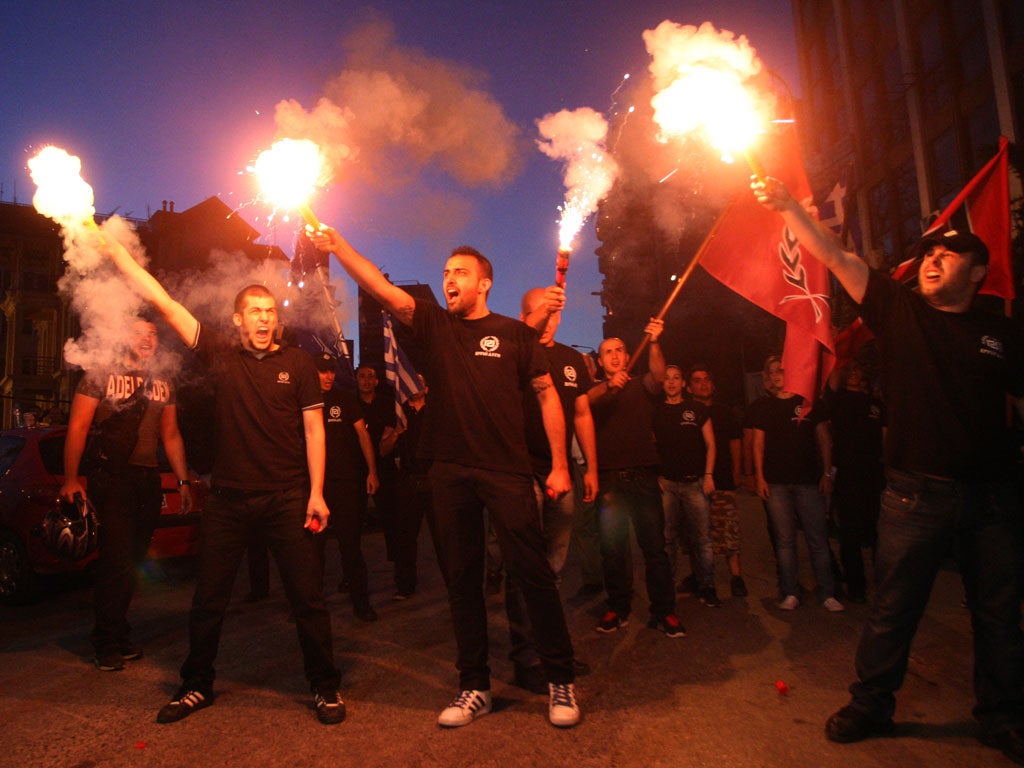The Golden Dawn: A love of power and a hatred of difference on the rise in the cradle of democracy
The economic ethos of European neo-fascism, from the Golden Dawn to the British National Party, has historically been anti-neoliberal and anti-globalisation

“Wrap it up, you little faggots!” The huge bald man in blue screams at theatregoers on a public street in Athens. He is flanked by police, who do nothing to stop him hurling his racist, homophobic vitriol. “You little hooker, your time is up!
You f**ing Albanian asshole!" In a video shot on 11 October outside the opening of 'Corpus Christi,' Terrence McNally's controversial 1998 play that portrays Jesus as homosexual, the man, a member of the fascist Golden Dawn party, bellows abuse at theatregoers who were later beaten bloody by Neo-Nazis determined to shut down the show.
This man is no ordinary right-wing thug, however. He is a member of Parliament. Ilias Panagiotaros was amongst 18 Neo-Nazis elected to the Greek parliament earlier this year, exploiting the desperation of unemployed and needy Greek citizens to gain a foothold in mainstream politics. The mere fact that their party members hold public office, however, doesn't seem to have deterred Golden Dawn members from physically terrorising immigrants, homosexuals and their allies.
The scene outside 'Corpus Christi' is just the latest flashpoint. On his Twitter feed, Manolis V., a Greek blogger, claimed to have been harassed and kicked to the ground by Golden Dawn MPs as the police stood by and watched. That last detail will surprise few Greeks: some exit polls suggested that half of the Athenian police force voted for the Golden Dawn at the last election.
The Golden Dawn does not behave like a party that has much respect for the parliamentary process. It first came to international attention before the May elections when one of its figureheads physically assaulted a left-wing female politician on live television. As an organisation which is fundamentally anti-democratic, there is a ponderous question-mark over whether the Golden Dawn should have been allowed to stand in representative elections in the first place.
The mockery the 18 Golden Dawn MPs currently sitting in the Hellenic parliament continue to make of the democratic process is painfully felt by many Greeks who pride themselves on their nation's role as the 'cradle of democracy.'
However, there's one area where the parliamentary strategy of the Greek far-right seems remarkably consistent: its selective support for neoliberal economic policymaking. Golden Dawn MPs in parliament have voted consistently against the proposals of the larger parties - the left-leaning Pasok and the centre-right New Democracy - except when it comes to the privatisation of public banks like ATEbank, with its assets of over €33bn.
Greece's growing Neo-Nazis faction has built its support on opposition to austerity. It has gained popularity by operating soup kitchens and food drives in needy areas of Athens - only for 'native Greeks', of course. However, the fascists' practical economic strategies do nothing to halt the privatisation of public assets and publicisation of private debt which are driving the Greek economy further into the ground. They may claim to sympathise with the plight of Greek workers, but the fascists' parliamentary strategy seems set to worsen that plight.
Meanwhile, in rural areas of the country, the Golden Dawn has begun to intervene directly in the job market, setting up employment agencies 'For Greeks Only.' Local business owners in places like the island of Evia are being intimidated into firing all immigrant workers and hiring Greeks instead - at similar poverty wages.
If immigrants get paid 18 Euros a day for manual labour and have no rights to collective bargaining or decent employment conditions, the argument goes, then the same should apply to Greek workers. This is the new logic of neoliberal fascism - an economy of racism - and its practical application is not wholly dissimilar to workfare policies being pursued in nations across Europe.
Fortunately, many Greek workers are not fooled. A collective statement by the Food and Drink Workers of Evia describes how "the Golden Dawn visited companies in our industry, asking owners to replace migrant workers with Greeks. The action in each case serves the goals of the bosses who want to divide workers and undermine their rights," wrote the group. "We want the Golden Dawn to know that workers in our industry have no problem with immigrants. The problem we have is with our bosses who have not paid us for [up to] 6 months."
The economic ethos of European neo-fascism, from the Golden Dawn to the British National Party, has historically been anti-neoliberal and anti-globalisation, exploiting local fears about the internationalisation of labour to build support for racist hate-speech. Once they gain even a scrap of power, however, today's fascist parties quickly demonstrate that their sympathies lie not with ordinary workers, but with bosses and bankers - just as one might expect from organisations whose guiding principles are love of power and hatred of difference.
Join our commenting forum
Join thought-provoking conversations, follow other Independent readers and see their replies
Comments
Bookmark popover
Removed from bookmarks